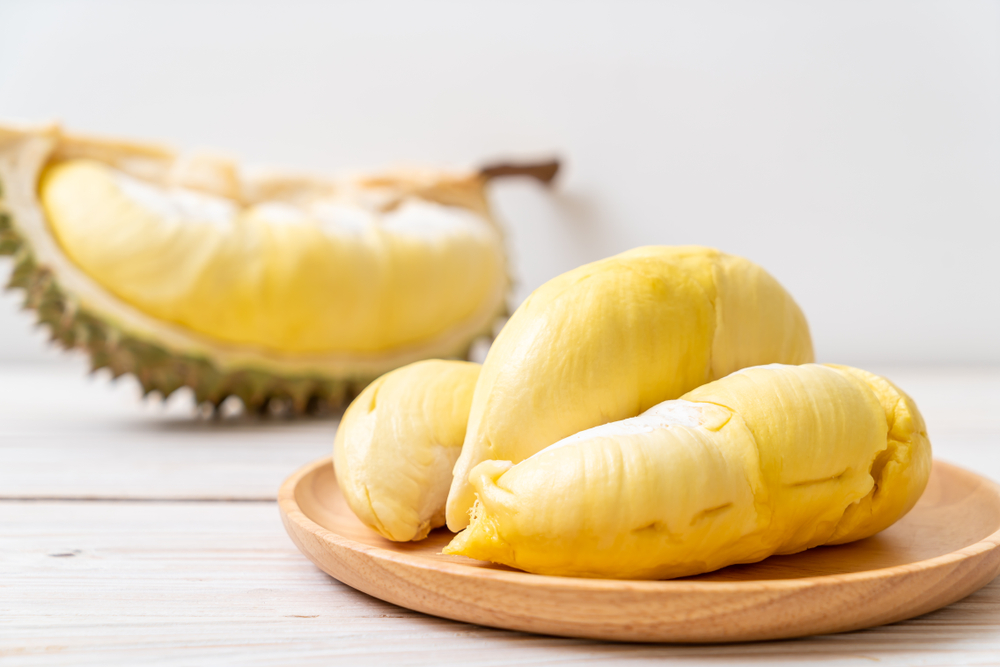Crowned as the ‘King of Fruits’, durian is arguably the most iconic fruit of Malaysia. Durians are best known for its distinctive smell that divides the people into two groups – durian lovers and durian haters.
The unique flavour in durians is attributable to the presence of over 100 volatile compounds, including some that contribute to the smell of skunk, caramel, rotten egg, rotten onion and fruits.
How you feel about the fruit actually depends on whether you smell the pleasant-smelling or stinky compounds more strongly!

Well, love or hate it, the durian is actually a high scorer when it comes to its nutrient profile. Here are some of the reasons why it is actually a great fruit!
Durians have a great antioxidant potential
Durians contain a variety of flavanoids, polyphenols and carotenoids. It is also high in vitamin C. All of these are antioxidants helps to protect your cells and DNA from free radical damage.
In fact, 1 cup of durian (243g) contains more than half of the vitamin C we need each day! Vitamin C is important in maintaining healthy skin, bones and teeth.
They help in digestion and maintaining your blood sugar
Durians are rich in dietary fibre, which is essential for regular bowel movements and your digestive health. Fibre slows down the digestion of carbohydrates to glucose. Therefore, durians have a smaller effect in increasing your blood sugar levels.
The fibre content contributes to a lower glycaemic index (GI) in durians, despite its high sugar content. In fact, the GI of durian is lower than other local fruits like papaya and pineapple!
Durians have high folate content
Folate is present in a wide variety of foods, but in low concentrations. Therefore, it is relatively difficult for people who consume less fruits and vegetables to meet their folate requirements. However, durians are exceptional when it comes to folate content!
1 cup (243g) of durian will already cover your daily folate requirement.
Folate is required for cell division, particularly red blood cells. Besides that, folate also plays an important role in DNA synthesis, which is an essential part of normal growth.
Durians are excellent sources of potassium
Bananas have always been famous for having a high potassium content .
But do you know that durians (456mg per 100g) contain more potassium than bananas (358mg per 100g)?
Potassium is known to be able to reduce the effects of sodium that increase your blood pressure, therefore it is important to get enough potassium each day! The recommended daily intake for potassium is 4700mg, and the main food sources are fruits and vegetables.
Durians are high in energy content
Durians are high in calories and fat as compared to other fruits.
This makes it a great source of energy if you are looking for a more filling option among fruits. Moreover, the majority of fats in durians are monounsaturated fats that are known to be good for your cardiovascular health.
However, for those who are concerned about weight gain, you might want to be mindful when eating durians as they could significantly spike up your calorie intake in a day!
Durians may improve your mental health and sleep too!
Yes, we’re not kidding – there is scientific reasoning behind this!
Durian contain high levels of tryptophan, an essential amino acid that is used to produce serotonin, the ‘happiness hormone’ and melatonin, the ‘sleep hormone’. Therefore, durians may actually help improve your well-being.
Be moderate
Yes, durians are excellent in terms of nutrition! This might be a great news for you if you love durians. However, do keep in mind that everything we consume should be eaten in moderation as too much of anything can be bad for you!
References
- Li, J., Schieberle, P. and Steinhaus, M. (2012). Characterization of the Major Odor-Active Compounds in Thai Durian (Durio zibethinus L. ‘Monthong’) by Aroma Extract Dilution Analysis and Headspace Gas Chromatography–Olfactometry. Journal of Agricultural and Food Chemistry, 60(45), pp.11253-11262.
- Ndb.nal.usda.gov. (2019). Food Composition Databases Show Foods — Durian, raw or frozen. [online] Available at: https://ndb.nal.usda.gov/ndb/foods/show/09422 [Accessed 29 Aug. 2019].
- A Aziz, N. and Mhd Jalil, A. (2019). Bioactive Compounds, Nutritional Value, and Potential Health Benefits of Indigenous Durian (Durio Zibethinus Murr.): A Review. Foods, 8(3), p.96.
- Utm.my. (2019). Exploring the Nutritional Contents and Benefits of Durian (Durio zibethinus) | IBD. [online] Available at: http://www.utm.my/ibd/project/exploring-the-nutritional-contents-and-benefits-of-durian-durio-zibethinus/ [Accessed 29 Aug. 2019].
- Nutrition.moh.gov.my. (2019). [online] Available at: http://nutrition.moh.gov.my/wp-content/uploads/2017/05/FA-Buku-RNI.pdf [Accessed 29 Aug. 2019].
- Striegel, L., Chebib, S., Dumler, C., Lu, Y., Huang, D. and Rychlik, M. (2018). Durian Fruits Discovered as Superior Folate Sources. Frontiers in Nutrition, 5.